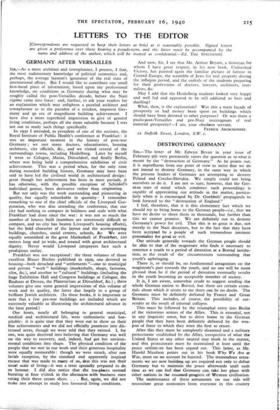LETTERS TO THE EDITOR
[Correspondents are requested to keep their letters as brief as is reasonably possible. Signed letters are given a preference over those bearing a pseudonym, and the latter must be accompanied by the name and address of the author, which will be treated as confidential.—Ed. THE SPECTATOR]
GERMANY AFTER VERSAILLES
SIR,—As a mere architect and townplanner, I possess, I fear, the most rudimentary knowledge of political economics and, perhaps, the average layman's ignorance of the real state of international affairs. But I would like to contribute one small first-hand piece of information, based upon my professional knowledge, on conditions m Germany during what may be roughly called the post-Versailles decade, before the Nazi regime came into force : and, further, to ask your readers for an explanation which may enlighten a puzzled architect and townplanner as to the paradox of a stricken, impotent Ger- many and in era of magnificent building achievement. I have also a more superficial impression to give of general living conditions, perhaps all the more valuable because I was not out to study such things specifically.
In 1931 I attended, as president of one of the sections, the Royal Institute of Public Health's conference at Frankfurt : it was an important moment in the history of post-war Germany ; we met many doctors, educationists, housing architects, city officials, &c., and we visited several of the surroundings towns, including Heidelberg. Later by myself I went to Cologne, Mainz, Dusseldorf, and finally Berlin, where was being held a comprehensive exhibition of civic achievement. This was a period when, for the only time during recorded building history, Germany may have been said to have led the civilised world in architectural design : great though her achievement has been in most periods, it has otherwise, with the possible • exception of Schinkel's individual genius, been derivative rather than originating.
But not only was the work outstanding and pioneering in quality, but equally remarkable in quantity : I remember remarking to one of the chief officials of the Liverpool Cor- poration, who was also attending the conference, that our city had nothing to compare in boldness and scale with what Frankfurt had done since the war: it was not so much the number of houses built (numbers are notoriously difficult to compare, and no city has beaten Liverpool's housing efforts), but the bold character of the layout and the accompanying buildings, churches, social centres, schools, &c. We were equally astonished at the great Markethall of. Frankfurt, 220 metres long and 5o wide, and treated with great architectural dignity. Never would Liverpool ratepayers face such a prodigious outlay.
Frankfurt was not exceptional : the three volumes of those excellent Blauer Bucher published in 1929, one devoted to housing—both detached and " settlements "—one to municipal and private " work " buildings (markethalls, shops, factories, silos, &c.), and another to " cultural " buildings (including the huge Exhibition Hall and Congress buildings at Cologne, the Bauhaus at Dessau, the Planetarium at Diisseldorf, &c.) ; these volumes give one some general impressions of this volume of work and its quality, the latter due largely to a group of brilliant Jewish architects. (In these books, it is important to note that a few pre-war buildings are included which are extremely valuable as illustrating the architectural advance in the later period.)
Our hosts, nearly all belonging to general municipal, medical and architectural life, were enthusiastic and hos- pitable: it is quite true that they were out to show us their fine achievements and we did not officially penetrate into dis- tressed areas, though we were told that they existed. I, for one, was quite deceived into believing that Germany was well on the way to recovery, and, indeed, had got her environ- mental conditions into shape. The physical condition of the people that we met in our work and their generous hospitality were equally memorable : though we were struck, after one lavish reception, by the standard and apparently inspired excuse that was made to many of us, ;bat this was not their usual scale of living—it was a treat specially prepared to do us honour. I did also notice that the tea-places seemed bursting at four o'clock in the, afternoon. with business men eating their three cream slices. . . . But, again, we did not make any attempt to study less favoured living conditions. And now, Sir, I see that Mr. Arthur Bryant, a historian for whom I have great respect, in his new book, Unfinished Victory, has painted again the familiar picture of famine in Central Europe, the scramble of Jews for real property during the inflation period, and the ordeals of the students preparing for their professions of doctors, lawyers, architects, jour- nalists, &c.
May I add that the Heidelberg students looked very happy and well fed and appeared to be still addicted to beer and duelling?
What, then, is the explanation? Was this a mere facade of prosperity or had money been spent on buildings which should have been devoted to other purposes? Or was there a paulo-post-Versailles and pre-Nazi interregnum of real material prosperity?—I am, your obedient servant,
22 Suffolk Street, London, S.W. 1.
PATRICK ABERCROMBIE.






































 Previous page
Previous page